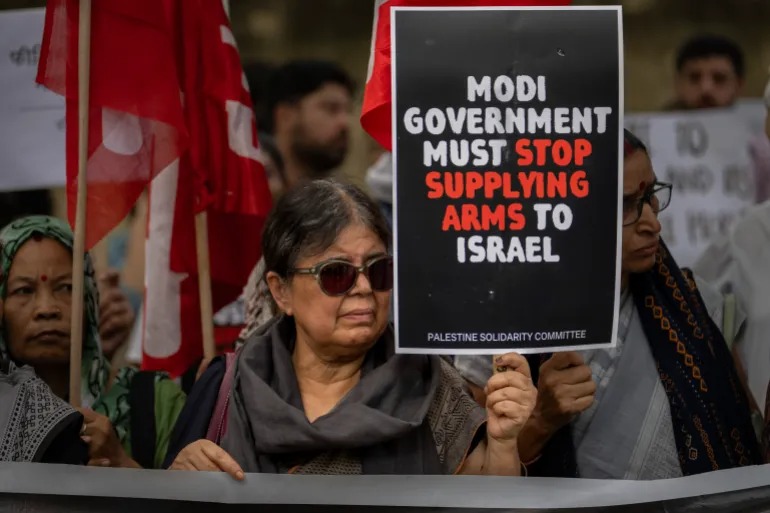When Babies Die, Can Profit Be the Only Priority?
✍ Atoofa Nasiha
On September 8, 2025, India and Israel signed a Bilateral Investment Agreement (BIA) in New Delhi, aiming to enhance economic cooperation between the two nations. This agreement, signed by Indian Finance Minister Nirmala Sitharaman and Israeli Finance Minister Bezalel Smotrich, is a significant achievement for Israel which is being isolated in the Global Arena. Israel with its genocidal crimes has been losing its traditional European allies one by one and standing alone. On the other hand, what India gains through this agreement is a big question. Seen at the backdrop of ongoing Genocide in Gaza, it could end up as the worst Foreign Policy disaster for India.
Who visited India to sign the investment deal (BIA)?
Israeli Finance Minister Bezalel Smotrich visited India to sign the Bilateral Investment Agreement alongside Indian Finance Minister Nirmala Sitharaman. Smotrich, a far-right politician, is widely known for his incendiary rhetoric against Palestinians and his controversial policies in the occupied territories. His presence in New Delhi has drawn international attention, as he has been sanctioned by several Western countries, including France, the UK, and Canada, for his statements and actions. Despite this, India formally hosted him for the agreement, underscoring the government’s focus on ties with Israel.
What is BIA?
The Bilateral Investment Agreement (BIA) is a treaty between two countries designed to promote and protect investments made by investors from each country in the other. It provides legal safeguards, dispute resolution mechanisms, and assurances for investors, aiming to encourage trade, economic cooperation, and cross-border business growth.
Key Provisions of the BIA
Investment Protection: The agreement aims to provide greater certainty and protection for investors, facilitating the growth of trade and mutual investments by ensuring an independent dispute resolution mechanism through arbitration.
Economic Cooperation: Both nations emphasised their commitment to advancing economic cooperation in fields such as fintech innovation, infrastructure development, financial regulation, and digital payment connectivity.
Strategic Significance: This agreement is viewed as a foundational step toward initiating Free Trade Agreement (FTA) negotiations between India and Israel, signalling a deepening of economic and strategic ties.
Historical Context
India has always been a trusted ally of Palestine and Palestinian people since the days of Mahatma Gandhi characterised by mutual support and solidarity since 1947. In 1974, India became the first non-Arab country to recognise the Palestine Liberation Organisation (PLO) as the sole legitimate representative of the Palestinian people. Subsequently, in 1988, India was among the first countries to recognize the State of Palestine. In 1996, India opened its Representative Office in Gaza, which was later moved to Ramallah in 2003.
 Additionally, in 1981, India issued a commemorative stamp in solidarity with the Palestinian people, featuring the flags of India and Palestine. This stamp was released on November 29, 1981, as part of India’s support for the Palestinian cause.
Additionally, in 1981, India issued a commemorative stamp in solidarity with the Palestinian people, featuring the flags of India and Palestine. This stamp was released on November 29, 1981, as part of India’s support for the Palestinian cause.
However, since 2014, the Bharatiya Janata Party (BJP) Government has drastically changed the colours moving closer to Israel. This shift has been characterised by increased defence cooperation, joint military training, and intelligence sharing. Critics argue that this alignment may be at odds with India’s traditional stance on Israel’s war on Gaza.
India’s Shifting Stance on Palestine
Let’s explore how India’s stance on Palestine has evolved over the years, from strong support and solidarity to a more cautious and neutral approach in recent decades, reflecting changes in India’s domestic politics and international alignments.
Early Support and Recognition (1947-1988)
India’s relationship with Palestine was marked by solidarity from the very beginning. In 1947, India opposed the partition of Palestine at the United Nations General Assembly, aligning with its anti-colonial stance. In 1974, India became the first non-Arab country to recognise the Palestine Liberation Organisation (PLO) as the sole legitimate representative of the Palestinian people. Later, in 1988, India was among the first countries to recognise the State of Palestine.
Diplomatic Engagement (1996-2007)
In 1996, India opened its Representative Office in Gaza, which was later shifted to Ramallah in 2003. This move underlined India’s continued support for Palestinian self-determination. In 2007, India participated in the Annapolis Conference, reaffirming its commitment to a two-state solution.
Shifts in Policy under BJP (2014-2019)
Since 2014, under the leadership of the Bharatiya Janata Party (BJP), India has gradually moved closer to Israel while maintaining formal support for Palestine. This “de-hyphenation” policy allowed India to strengthen ties with Israel without overtly diminishing its stance on Palestine. In 2019, India voted in favour of Israel’s resolution to deny observer status to a Palestinian NGO at the UN Economic and Social Council, signalling a notable shift from its earlier pro-Palestinian positions.
Recent Developments (2023-2025)
During the recent Gaza genocide, India has taken a more cautious approach. In 2023, India abstained from a UN General Assembly vote calling for an immediate ceasefire in Gaza. Similarly, in 2025, India abstained from voting on another Gaza ceasefire resolution at the UN. Despite this, India has occasionally supported resolutions urging Israel to withdraw from Palestinian territories occupied since 1967, maintaining a nuanced position that balances its pro-Israel tilt with historical support for Palestine.
Humanitarian Angle
The signing of the BIA comes at a time when Gaza is experiencing severe humanitarian distress due to the genocidal war by Israel. Reports indicate that over 64,000 Palestinians have been killed and more than 160,000 wounded since October 2023, leading to widespread international condemnation. Despite these concerns, India has continued to engage in defence cooperation with Israel, including arms supplies, raising questions about its position on the ethnic cleansing of Gaza.
The humanitarian situation in Gaza has deteriorated rapidly, with widespread displacement, destruction of infrastructure, and shortages of essential supplies. The United Nations and other humanitarian organisations have called for immediate ceasefires and increased aid to address the Genocide.
Economic Analysis
The BIA is expected to facilitate investments in sectors such as technology, defence, infrastructure, and startups. Both governments aim to create a favourable environment for businesses from both countries to collaborate, potentially boosting bilateral trade and economic growth.
While the agreement may benefit corporations and governments by providing a secure investment environment, questions remain about the impact on citizens, particularly in Gaza, where the ongoing Genocide hampers economic development and access to basic services.
Geopolitical Implications
India’s growing ties with Israel may affect its relations with Arab countries and the broader Muslim world. Historically, India has maintained a policy of supporting Palestinian rights, but recent developments suggest a shift towards closer alignment with Israel. This shift could influence India’s standing in the United Nations and other multilateral forums, where it has traditionally supported resolutions favourable to Palestine.
 For Israel, the agreement with India represents an opportunity to strengthen its diplomatic and economic ties with a significant Asian power, potentially enhancing its position in the region.
For Israel, the agreement with India represents an opportunity to strengthen its diplomatic and economic ties with a significant Asian power, potentially enhancing its position in the region.
Public Opinion & Criticism
The announcement of the BIA has sparked reactions from various sectors of Indian society. Civil society organisations, academics, and journalists have expressed concerns about the timing of the agreement amid the ongoing Israel imposed starvation in Gaza. Protests and petitions have emerged calling for India to reconsider its engagement with Israel during this period.
Internationally, the agreement has drawn criticism from human rights organisations and governments advocating for Palestinian rights, who view the timing as insensitive given the ongoing Genocide in Gaza by the illegally occupied Israel.
Moral & Ethical Questions
The signing of the BIA raises moral and ethical questions about balancing economic interests with human rights considerations. Critics argue that pursuing trade and investment agreements with Israel during the ongoing Ethnic Cleansing in Gaza is perceived as prioritising economic gains over the well-being of civilians affected by the Apartheid State, Israel.
Supporters of the agreement contend that economic cooperation can lead to stability and peace, suggesting that closer ties between India and Israel could contribute to regional security and development.
International Comparison
India’s stance on continuing economic relations with Israel amid the Gaza Genocide contrasts with that of several other countries. For instance, the United Kingdom, Canada, and Norway have imposed sanctions on Israeli officials in response to the humanitarian crisis. In contrast, India has maintained its defence cooperation with Israel, raising questions about its position on the global stage and its commitment to human rights.
Quotes & Statements
Indian Government: Finance Minister Nirmala Sitharaman emphasised that the BIA aims to provide a secure and stable investment environment, encouraging Indian companies to invest in Israel with increased confidence.
Israeli Government: Finance Minister Bezalel Smotrich highlighted that the agreement is expected to boost bilateral investments and create a favourable environment for businesses from both countries to collaborate.
Human Rights Organisations: The United Nations and other humanitarian groups have called for immediate ceasefires and increased aid to address the crisis in Gaza, emphasising the urgent need for international intervention.
Possible Outcomes
The BIA could pave the way for a Free Trade Agreement (FTA) between India and Israel, enhancing economic cooperation and trade between the two nations. However, the agreement’s timing amid the Genocide in Gaza may lead to diplomatic backlash from countries and organizations advocating for Palestinian rights. Additionally, India’s continued defence cooperation with Israel could impact its relations with Arab countries and the broader Muslim world.
Economic agreements cannot replace moral responsibility. At a time when Gaza faces widespread destruction and suffering, India’s engagement with Israel through the Bilateral Investment Agreement is infuriating, immoral and unethical. Standing with humanity means prioritising the protection of innocent lives and using diplomatic influence to demand an end to violence. True progress comes from supporting the oppressed, ensuring aid reaches those in need, and holding all parties accountable for actions that threaten peace and justice.




